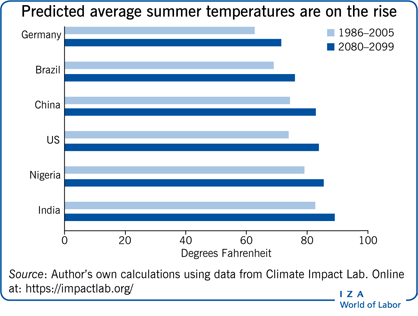Elevator pitch
Climate change is rapidly deteriorating environmental conditions through droughts and floods, hurricanes, wildfires, rising temperatures, and more frequent and longer heatwaves. A growing literature has shown how higher temperatures reduce worker productivity and economic output. These effects are more pronounced in poorer countries and in climate-exposed economic sectors like agriculture, construction, and manufacturing. The development of new technologies that mitigate exposure to heat among workers, combined with better temperature control in the workplace, will be essential to reduce the economic burden of climate change.

Key findings
Pros
Rising temperatures due to climate change may increase income in some countries where current temperatures are sub-optimal for economic production.
Investments in workplace infrastructure and adaptative measures to maintain ambient temperatures closer to productivity-maximizing levels may help mitigate some of the negative impacts of elevated temperatures on productivity and incomes.
The marginal effect of temperature on GDP levels is more precisely estimated than the effect on GDP growth.
Cons
Higher temperatures may reduce economic output through direct effects on worker productivity, by reducing cognitive or physical skills, labor supply or effort, or by reducing the productivity of other inputs that are complementary to labor.
In the absence of future technological changes or productivity-increasing adaptations that can mitigate the negative impacts of high temperatures, average “business as usual” projections point to sizable reductions in average global incomes by 2100, relative to a world without climate change.
There is a high degree of uncertainty about the predicted impacts of climate change on future levels of income and income growth rates.